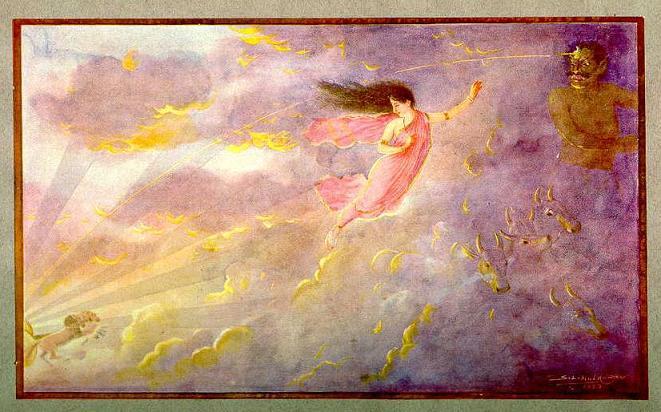srigurubhyO namahA |
The 193rd mantrA is one that is shrouded in paribhAsha or symbolic words. Though the external meaning of verse is something that makes sense by itself, the esoteric and hidden meaning conveyed through this verse is of great importance to the sincere adept who is intent on cultivating the light body. In the later tantrAs, this topic will be revisited and I will provide a more detailed commentary of the actual process at that juncture. Suffice it to say here that I have explained the current verse by keeping in mind the greater context of kAyAkalpA and other such yOgic methods capable of transforming this limited body into something far superior.
The 193rd mantrA is one that is shrouded in paribhAsha or symbolic words. Though the external meaning of verse is something that makes sense by itself, the esoteric and hidden meaning conveyed through this verse is of great importance to the sincere adept who is intent on cultivating the light body. In the later tantrAs, this topic will be revisited and I will provide a more detailed commentary of the actual process at that juncture. Suffice it to say here that I have explained the current verse by keeping in mind the greater context of kAyAkalpA and other such yOgic methods capable of transforming this limited body into something far superior.
துடுப்பிடு பானைக்கும் ஒன்றே அரிசி
அடுப்பிடு மூன்றிற்கும் அஞ்சொ கொள்ளி
அடுத்தொ யாமற் கொடுமின் அரிசி
விடுத்தன நாள்களும் மேற்சென் றனவே. I.5.7.193
அடுப்பிடு மூன்றிற்கும் அஞ்சொ கொள்ளி
அடுத்தொ யாமற் கொடுமின் அரிசி
விடுத்தன நாள்களும் மேற்சென் றனவே. I.5.7.193
Same the rice
of life that in all body-pots boil;
The Five are the fuel that feeds and kindles the burning Three,
Gifts of rice in charity give, lest birth flame anew,
The days missed of such deeds are for ever lost to Thee. I.5.7.193
The Five are the fuel that feeds and kindles the burning Three,
Gifts of rice in charity give, lest birth flame anew,
The days missed of such deeds are for ever lost to Thee. I.5.7.193
Com - Same the rice of life that in all body-pots boil; vindhu (semen/sexual fluids) is like the
rice (that is cooked) in the pot like body where the central channel or sushumnA nAdi is like a ladle. The Five are the fuel that feeds and
kindles the burning Three, the
sOmasUryAgni (the moon, the sun and fire) mandalAs that are present within the body is like the fire (to cook
with) for which the five types of vAyu
(vital airs) are the fuel to keep it burning. Gifts of rice in charity give, lest birth flame anew, One must
practise the method of preserving this vindhu
Shakti or seminal fluids and then transmuting it through the medium of fire
to exchange it for the nectar that oozes from the lunar orb . The days missed of such deeds are for ever
lost to Thee. (Instead) people sadly waste the limited time they have on
this earth through expending this sexual energy wantonly and without proper
awareness of what actually is happening.
*Once
again, the Tamil original is different in construct to the English translation
and I have provided the commentary following the original verse. The term ‘அரசி‘though meaning rice
ordinarily is used here with a different and more esoteric meaning. It is to be
understood as a reference to vindhu
or semen. The sage speaks here about the yOgic
process through which the adept transmutes the sexual fluids through the agency
of the fire into something that is altogether more valuable. The five vAyus or vital airs (prAnA, apAnA, vyAnA, udAnA and samAnA) when controlled (though the
technique of pranayama), help the
adept to cultivate the agni mandala
or orb of fire. Focussing the breath to flow through the central channel of sushumnA, he is able to merge the ten kalAs of the agni mandala into the twelve kalAs
of the sUrya mandala or solar orb and
then finally the solar orb into the sixteen kalAs
of the Chandra mandala or lunar orb.
Through the conservation of semen and the correct flow of breath, he begins to
cultivate his light body. This indestructible body is referred to through the
words ‘nectar of the moon’. Thus the sage advices the devotee to make haste and
begin the process of cultivating the immortal body (of light) through the
divine path of sivayOgA, instead of
foolishly wasting one’s days and more importantly wasting the vital energies
that will enable one to accomplish this yOgA.
thirucchitrambalam ||
